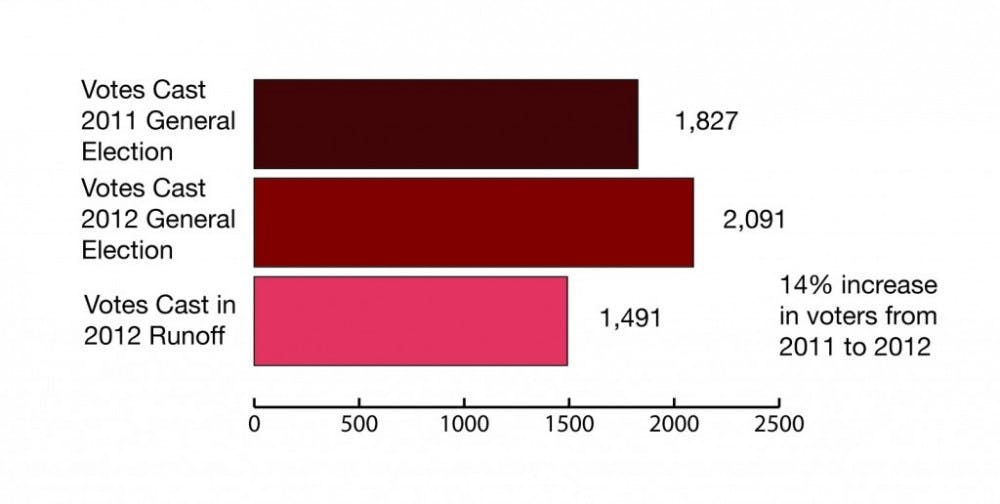Whether students voted in the recent Student Government Association election was largely determined by whether they heard directly from the candidates and how much significance they felt their vote would have.
SGA election gave students a chance to exercise their right to vote and allowed them to have a decision about which of their peers will represent the student body. But even though voting only takes several minutes, not all students participate in the voting process.
According to senior Grant De Roo, SGA elections co-chair, while there was an increase from the number of students who voted last year, only about half the student body voted this year.
“This year, there were 2,091 students that voted compared to 1,827 from last year,” De Roo said. “If we increase the voting base by 50 students every year, we are increasing the voting base by 1 percent.”
Although only half the student body voted, De Roo said he is pleased with the outcome this year, including the participation in the runoff election in which 1,481 students voted.
The increase in the voter base benefits SGA because, with every increase, more students are represented, De Roo said. He attributes this year’s increase to three factors: Media coverage, the number of candidates and the work of the candidates.
Phoenix 14 News covered SGA’s debate live allowing candidates to respond to questions and talk about their platforms. De Roo said the media coverage this year, particularly from The Pendulum and Phoenix 14 News, helped increase the interest of students in the candidates themselves and what SGA can do for them.
De Roo said he also believes the number of candidates running for positions affects how students portray the significance of their vote. As opposed to last year’s two candidates, this year there were four candidates running for executive president.
“I think it just depends on how contested of an election it is,” he said. “With four candidates (running for executive president), people’s votes counted more as opposed to last year when there were only two candidates. Also with four candidates, they have different groups that they are close to or tied to so that would increase the voter base as well.”
De Roo also said he felt the candidates did a good job this year of going out and talking to students and student groups in person. He said they tried to reach out to more diverse groups this year so there would be less of an overlap in the number of students in the same groups they talked to.
Some students said this personal connection was what encouraged them to vote, including junior Cecil Worsley, who said he would not even have considered voting if candidates had not come to talk at his fraternity’s chapter meeting.
“The candidates for the different positions came to our chapter and presented some of the issues that they were going to work to improve or correct,” Worsley said. “I had no idea that they had that much influence over the campus. Before, I didn’t think (SGA) was that important at all.”
Other students who did not personally hear from the candidates said if they had had this opportunity, they might have understood more of the importance of SGA and took the time to vote.
“I would have voted if I knew more about (SGA) and I knew more about what it can actually do to help,” said freshman Alex Komrovsky. “I basically know nothing about it.”
But De Roo said each year is a learning process for SGA and for the candidates running.
“Each year, people learn from the innovative things that past candidates have done,” he said. “And students should realize that after their time at Elon, very rarely will they have a vote in a political election that will count so much.”


